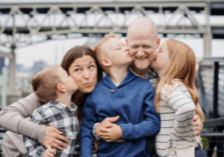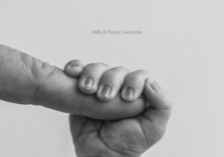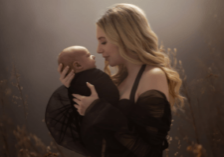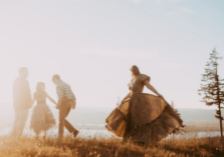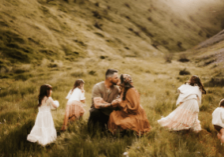Sales Psychology, Strategy, and Soul: Unlocking Your Unique Magic with Eden Strader
As a photographer, you probably started taking photos because you loved some aspect of it, right? Maybe the artistry or the relationships you built, or the freedom that career seemed to offer you.
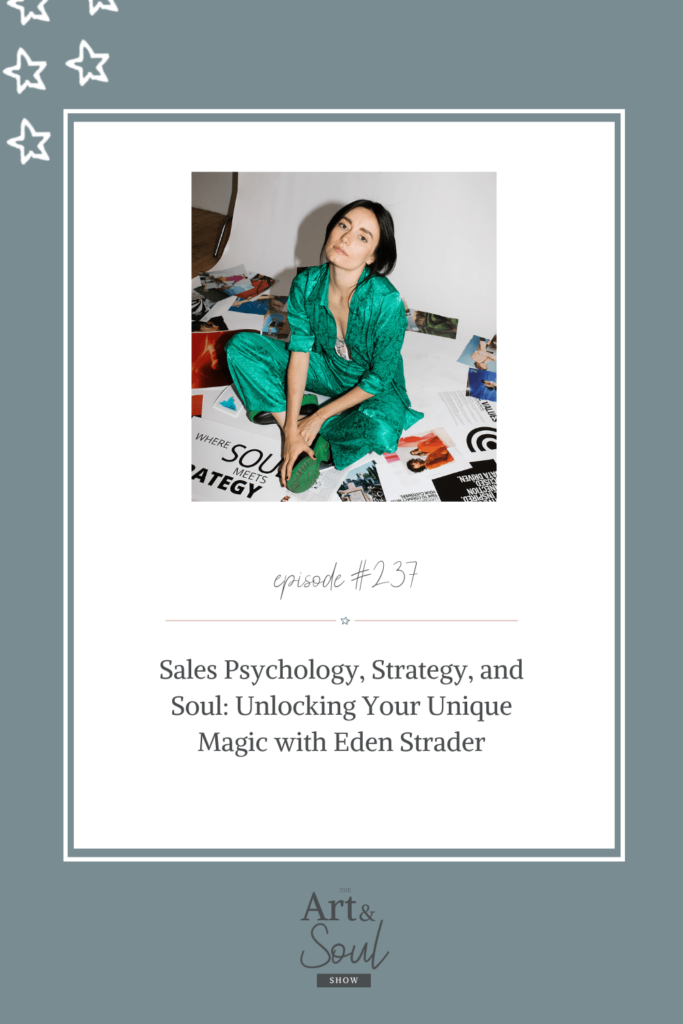
But at some point, many of us find ourselves overwhelmed, overworked, and out of love with the career we once dreamed of. So, if that’s where you find yourself today, how do you recover? How do you find your spark again?
Well, in this episode, Eden Strader is here to help. She’s a photographer turned business coach, helping other creatives rediscover their passion for their work, while building a life they love outside of work too.
What’s in this episode:
- [01:58] How Eden began mentoring other photographers and creatives
- [05:40] How to create a business of your dreams that also creates the life you want too
- [08:27] The first step photographers can take to climb out of the pit of despair we sometimes find ourselves in
- [16:04] The psychology of sales and how understanding this aspect can help you find more joy and balance in your work
- [26:04] How to find passion for your work again as a photographer
- [31:08] What success looks like to Eden
- [41:06] How Eden channels her ADHD and builds her flexibility into her work patterns
If you’ve fallen out of love with photography and are trying to find your way back, this episode with Eden Strader is just for you.
SUBSCRIBE: Apple Podcasts | Spotify
Meet Eden Strader
Eden Strader is the only six figure photographer and business coach who inspires creative entrepreneurs, artists, and makers to build a life of artistic growth, wealth, and personal power with carefully curated strategies in marketing, mindset, sales strategy, and self care through excavating her client’s unique brand of magic. Everything Eden Strader is based on the concept that we should be building our dream businesses in order to have our dream lives – not stopping at the business as the final destination. She’s been seen in Martha Stewart Weddings, Junebug Weddings, Fox News, Green Wedding Shoes, Utah Valley Bride, The Venue Report, and many more.
Connect with Eden
Did this episode with Eden make you reconsider how you prioritize your life and business? Check out this episode Cultivating a Balanced Business (and life) with Balance Coach & Photographer Jenna Henderson
Transcript
[00:00:00] Eden: And so, yeah, I think there’s a big misconception that one self care has to look a certain way and two, even that it has to look the same every day. And it doesn’t like I am a person that really thrives on diversity and play. And so when I gave myself permission to let self care look like whatever I wanted it to feel that day, things really changed for me.
[00:00:23] And so when I challenge people to go into this, like, let’s take care of ourselves for an hour a day. Sometimes you don’t even have to try something new. Like sometimes it’s like not even self care. It’s just like going about your daily activities and your routines with more intention and gratitude and presence.
[00:00:44] Lisa: Hey friend, welcome to the Art and Soul Show. I’m your host Lisa DiGeso, a mom, a photographer, and entrepreneur. Tune in here for pep talks, conversations, and advice on photography, creativity, mindset, business, life, and that messy in between. [00:01:00] This is the place where you can go when you need a boost of encouragement, a kick in the pants, and inspiration to pick up your camera.
[00:01:06] This is the Art and Soul Show. Hello, my beautiful friends. Welcome back to the show today. I’m super excited to dive into today’s conversation with Eden Strader. Eden is the only six figure photographer and business coach who inspires creative entrepreneurs and business leaders. I’m your host, Eden Strader.
[00:01:23] Artists and makers to build a life of artistic growth, wealth, and personal power with carefully curated strategies in marketing, mindset, sales strategy, and self care through excavating her client’s unique brand of magic. Everything Eden Strader is based on the concept that we should be building our dream businesses in order to have our dream lives.
[00:01:43] not stopping at the business as the final destination. I have been so excited about this conversation for months and months, and we finally have Eden on the show. So welcome.
[00:01:54] Eden: Oh my gosh. Thank you so much for having me. I’m so excited to chat.
[00:01:58] Lisa: Well, Eden, you are known as the [00:02:00] only six figure photographer and business coach who inspires creative entrepreneurs to build lives of artistic growth, wealth, and personal power.
[00:02:07] So can you share what inspires you? Inspired you to pursue this path of coaching and mentoring others in the creative industry?
[00:02:14] Eden: Yeah, so I have been self-employed and running my own business since I was fresh, I would say out of college, but I didn’t graduate college. I was a dropout because my business took off.
[00:02:24] Yeah, same. But I’ve been. Yeah, I’m like, we ended up dropping out, which is great. And yeah, but I’ve been doing it for a really long time. So I started working for myself when I was like 18. I went full time when I was 20. So it’s really all I’ve ever known. And in the beginning of my business, I was married actually at the time I was the provider.
[00:02:44] And so I was even more motivated to build like a really successful business in the sense that I was paying for two people, I was paying for my ex’s school, I bought a house. And so I was working really, really hard, and it [00:03:00] was really beautiful to, like in hindsight, see what I was capable of in terms of building my own business and what I was able to achieve.
[00:03:09] But on paper, I did, I had this really beautiful business that was really successful. And behind the scenes, I was so miserable, so sad. There was lots of things going on in my life that added to that. But. My, my business truly was working me into the ground. It was something where I was working all day, every day.
[00:03:30] And when I got divorced, I got divorced right as the pandemic happened. I moved to LA. So I completely like burnt my, burnt my life down to the ground a little bit. We were at rock bottom, but it was this. Opportunity to really look at my life and look at my business and think to myself, like, is this what I want it to look like forever?
[00:03:52] Like, now that I have limitless possibilities and where I can go from here, where do I want to go? And what role do I want my [00:04:00] business to play in that? And so it was a really pivotal time for me. in identifying that I wanted my business to be this beautiful support and pathway to a better life. And I really was gifted that opportunity to like with my divorce and my business being the reason I was able to do that, right?
[00:04:20] Like I had the means to do that. I had the means to pay for a lawyer. I had the means to move to another city and start my life over. And that was entirely because of my business. And so for the last four years, I’ve really been on this journey of focusing on my life as much as I do my business. And my business was 100 percent the focus for the first half of my career.
[00:04:42] And the reason now it’s It’s really leveled out and it’s a tool. It’s a tool for building this life that I enjoy so much and I find so much fulfillment in and I’ve been very intentional in the way that I run my business and the ways that it shows up for me and my clients so [00:05:00] that we find fulfillment in the work itself as well.
[00:05:03] So it’s not just this thing that I clock into in order to have a good life. I want to. You know, we spend most of our lives at work. So it’s like, I want to love my job. I want to have a lot of fun with it. And then I want to have just as much fun, if not more, when I clock out. And so that’s really been like the guiding experience in my coaching and the way that I interact with my clients is just building this business that they can love, but not stopping there and making sure that our business is growing.
[00:05:32] Personal lives are just as fulfilled. They’re just as motivating and they’re just as successful as the business that we want to run.
[00:05:40] Lisa: I love that so much. I have been on a similar journey myself, not with a divorce, but when the pandemic hit, I was overworked, overbooked, undercharging. And pretty much when that pandemic hit, I hit a wall.
[00:05:55] And My brain, like it was, I had been hustle, hustle, hustle, hustle, hustle, but [00:06:00] everybody you can in. And I didn’t realize the extent of my burnout until I stopped. And I think it’s such a common, common, you know, plight of so many photographers in our industry that we don’t realize that we’re burnt out until we stop.
[00:06:16] And we actually have the opportunity to kind of just say, okay, with something that needs to change and I’m not happy in my business, I’m not happy in my life. So I love that, you know, you’ve got. I love this avenue that you’re taking because it is so important. We forget that, you know, we should be building that life we want instead of just the business we want.
[00:06:35] There’s so much focus on like building the business of your dreams that no one really talks about like how that affects the business of your life, you know, like your life really is. Absolutely. Right.
[00:06:46] Eden: Yeah. Yeah, we just we don’t talk about it enough. And there is such a, especially in the beginning, I like have this conversation a lot with my, my coaching clients that are like earlier on in their journey is that like, in the beginning, there, there are hustle periods, like, [00:07:00] especially in the beginning, when you’re getting things off the ground, and you’re getting things rolling, like, There’s going to be periods where you, you almost have to trade in some time in order to get things off the ground.
[00:07:10] But I think we, we’ve gotten into such a culture of hustle that there’s not enough discussions with people just getting started about the fact that you can also pace the hustle. Like it doesn’t all have to be done at once. You don’t have to build, you know, I think six figures got really glorified for a second there.
[00:07:30] That was kind of like our big buzzword. of let’s all earn six figures, let’s build these six figure businesses. And so people got really hung up on making that happen as if that was the ultimate achievement of life. And I saw a lot of people falling into that and, and sacrificing their personal life because of it.
[00:07:48] And if we’re not enjoying our lives and we’re also not enjoying our work, like what is it? all for like, what are we, what are we even doing it for?
[00:07:57] Lisa: Yeah. Like what is, if you don’t know what your big why is, like [00:08:00] why you’re even having your business, like you’re chasing this white elephant, like you just don’t even have a marker for success because you don’t even know what it is.
[00:08:08] Eden: No, exactly. And like, So many of us become self employed so that we can have better lives. Like, that’s always a motivator of like, I’m going to work for myself. It’s going to be beautiful. I’m going to have this beautiful life. And then you just end up working yourself like 20 times harder than, than any boss ever would.
[00:08:25] So when you have a client that
[00:08:27] Lisa: comes to you and they are in that sort of, we’ll call it the pit of despair, when they’re just, they don’t even know where to start with their life or their business. They know that they’re just miserable. What is the first step that you would suggest that they take?
[00:08:40] Eden: So when it comes to, to kind of getting people back into alignment, which is a kick I’ve been really on lately, my coaching has moved in like a much more personal direction.
[00:08:52] Really, my first approach is reconnecting with the passion that you started with in the beginning. So having [00:09:00] like very deep and honest conversations of like, Why did you start this? Like, what was the motivating factor? How can we bring some of that magic back? Because when we first start, like, whether we’re photographers or planners or whatever you’re doing, like, it’s coming from a passion.
[00:09:16] A lot of us start these businesses based off hobbies and we lose that fire as we monetize it, which is really sad, truly. And one of the biggest things with my clients is like, either one, how can we bring back that passion? Like, how can we reinstall that? How can we start practicing our craft for fulfillment rather than just monetary gain?
[00:09:39] Like, how can we bring back that, that love that you originally had? And if it’s too far gone, the question is like, what if we took a break? Like, what if we, like, do we need to give it a moment? Like, do we need to let it breathe? Do we need to take some time to take a step back and re evaluate what this means for us?
[00:09:59] I think [00:10:00] another thing to really approach it as to is like, One of my, like, follow up questions to every coaching call right as we, like, dive into things is, like, how’s your personal life going? Like, how are you taking care of yourself? How often are you experiencing joy in your day to day life? Like, are you prioritizing that?
[00:10:19] And usually where we start off with, with my coaching clients is I, I challenge them to have an hour a day. An hour a day where they just focus on pursuing joy. They focus on themselves. They really work on connecting with their bodies and their purpose. And one hour out of 24 does not sound like much, but it’s actually really difficult for people, like really, really difficult for people to set aside an hour where they don’t think about work.
[00:10:49] They don’t think about other people. They don’t think about their craft. And so that’s always like one of my first steps is like, let’s, let’s set aside an hour because what’s going to, not only are you [00:11:00] going to reconnect with yourself, but what’s going to come up for you is going to be. Really enlightening as to where we’ve maybe stepped out of alignment either personally or professionally or both.
[00:11:11] Lisa: Yeah, I love that. Two things came up for me with there and the first one was there is such a misconception about self care and what it is. Like, because a lot of the time we think it’s like a Starbucks or a bath and not everybody likes a Starbucks or a bath. So they’re like, I don’t like self care. I can’t do self care.
[00:11:29] Where it’s actually not that at all. So what approach do you have with clients when it comes to that adding in that self-care that maybe they’re missing?
[00:11:37] Eden: Oh my God. I love this question because I agree, and this is always a conversation I have with my clients, is like when we start talking about self-care, people love to, yeah.
[00:11:47] Go to those things like take a bath, meditate, do yoga. That was a super frustrating thing for me in the beginning of my journey. I’m not a meditator, like I’m just, I’m just not. I, I have a [00:12:00] DHD. It’s so difficult for me, like, and I’ve never enjoyed it, and I would leave so much more frustrated than I went into the meditation.
[00:12:08] So I was like, this is doing the opposite. And so, yeah, I think there’s a big misconception that one self care has to look a certain way. And two, even though it has to look the same every day, and it doesn’t, like, I am a person that really thrives on diversity and play. And so when I gave myself permission to let self care look like whatever I wanted it to feel that day, things really changed for me.
[00:12:33] And so when I challenge people to go into this, like, let’s take care of ourselves for an hour a day. It doesn’t even necessarily mean that you have to, sometimes you don’t even have to try something new, like sometimes it’s like not even self care, it’s just like going about your, your daily activities and your routines with more intention and gratitude and presence, like maybe it is that you just like spend a little extra time with your [00:13:00] coffee and cutting up your strawberries for breakfast and you really practice the art of self care.
[00:13:05] Staying present and thinking about how grateful you are to have this meal in front of you and to have this hour to connect with yourself. And that could be your self care for the day. For people that are like really wanting to, to get serious in a way that feels good for them. Always want people to like pursue mind, body, spirit, and that can kind of look like however they want it to like that is so different from person to person.
[00:13:30] And that can be different again day to day. So like to connect with my body. Sometimes I just get like really intentional about like the way I’m putting on my lotion and like making sure I like actually feel my body and like sink into it and like feel this home that I have. And then other days I feel like going on a run or I feel like going to the And that’s how I connect with my body.
[00:13:50] And it’s really dependent on like my energy for the day. And then for like mind and, and spirit, you know, it’s like some days you’re going to want to journal. Some days you’re going to want to [00:14:00] FaceTime a friend. Some days you’re going to want to pull tarot card. Sometimes you want to, you’re going to want to read.
[00:14:04] Um, there have also been days where I’m like, I just want to watch TV for an hour. Like that’s, that’s my self care is that I just, I need to zone out. I’m really overwhelmed. I need to just like op out of the hustle of things in my brain and just zone out for an hour. And I consider that self care too, like go into it with the intention of like, let, let me let some energy out.
[00:14:26] Let me get some anxiety out of my body and really sink into things. So I think that if people need a permission slip to not do traditional self care, this is it. It can look like whatever you need it to. I truly think it just comes down to your intentions and the way that you want to connect with your body.
[00:14:45] Like, what is your goal for that hour that you’re setting aside?
[00:14:49] Lisa: I love that. I think if we reframe it instead of calling it self care, it’s joy care and you’re really like trying to find those moments of joy and I [00:15:00] love, I love that because it’s such a different way of looking at it because self care almost feels like a task that you have to do.
[00:15:07] And joy feels like something that you get to do. So it’s like something that you’re going to look forward
[00:15:13] Eden: to. No, absolutely. Yeah. Like, how can you pursue joy for an hour? Right. Like, it becomes so much more fun and exciting. That sounds so
[00:15:21] Lisa: fun. Right? Versus like, oh, I gotta go meditate. Right. Side tangent.
[00:15:26] Mm hmm. Do you know much about Joe Dispenza? Do you follow him at all? But he has these meditations and for the life of me, his voice scares me. And so I try to meditate, but I’m also terrified at the same time.
[00:15:38] Eden: Really? It’s just, it’s not working. That’s so funny. Yeah. I, I literally, I have done one meditation once that like worked really well for me and it was a guided meditation, but it was like a spirit guide meditation, like something you’re not doing every day.
[00:15:52] Like I’m like, I did it once. And yeah, my brain just, my brain doesn’t work that way. No, absolutely. Or I just end up thinking about [00:16:00] everything and every noise goes off and I’m like, okay, but what if?
[00:16:04] Lisa: I love it. So I want to switch gears and talk a little bit about sales psychology. Because I know this is something that you’re really interested in, too.
[00:16:11] And can you maybe share what led you to explore this application in business?
[00:16:16] Eden: Yeah, so one of the things that I am really passionate about in my business, which has probably already hopefully come through, is that I’m just obsessed with the the personal pursuit of branding mixed with strategy and system.
[00:16:29] So like our big three in our business, we always say like system strategy and soul because I truly believe that each three of those are crucial and so imperative to the success of your business, your fulfillment in your business, both personally and monetarily. And so as I kind of reshaped my business several years ago and was really working on changing things, I got really serious about learning Transcribed by https: otter.
[00:16:53] ai More about, like, the principles that we don’t talk about that much as self employed folk. Especially, like, coming [00:17:00] from the wedding industry, there wasn’t a lot of talk about strategy or data or numbers. It, it very much is so focused on your craft, obviously, and it should be, like, let me be so clear, like, please focus on your craft and, and perfect that and be passionate about that.
[00:17:16] That does not need to be detracted from, but especially my move to New York, I moved to New York in 2021, and that was the first time I had really. Made a lot of friends with people that weren’t self employed. Like, that was my first kind of journey into more of a corporate scene and corporate world. I only had a couple of friends that were self employed.
[00:17:37] Majority all worked in a corporate sense. And at first it was incredibly intimidating just to be, like, surrounded by all of these people that, you know, went to college so much longer than me. And they were working on projects like Google. And You know, like just massive companies, but it was really enlightening to me in my business journey because I got to learn [00:18:00] so much about like corporate lingo and culture and perspectives that I just, I don’t have as someone that’s been self employed for so long.
[00:18:09] So something that’s been really fascinating for me has been reading about sales psychology and learning more about. What I really like about learning about sales psychology from other perspectives and like a more corporate perspective is I take it with a grain of salt. I will say like a lot of traditional sales psychology is a little outdated and it really does have the Madness.
[00:18:35] Reputation. Almost. Yes. Like, it’s very, like, structured, it, it almost sometimes can feel manipulative, like, I feel like we’ve kind of outgrown traditional sales psychology. And it was really fascinating to, to read and learn about that, though, and be like, how can I do this? in a better and like more aligned way.
[00:18:58] Like how can I do this in [00:19:00] a way that feels good to me? It feels good to my clients. And so such a huge part of that, I mean, it goes along with what we’ve already been talking about, but has been falling in love with my business. And what I really love about kind of like the creative landscape that we’re in right now is how intentional people are with their money and their investments.
[00:19:23] I think COVID changed a lot about. the way that we intake and the way that we consume in a really beautiful way. Like, we’re so much more intentional now with what we invest in and who we give our money to. And so with that pivot and like learning more about sales psychology, I was like, I think what we really need to be talking about in order to be selling to our ideal clients is, is how much we love our work.
[00:19:50] Like, Who are we as people? How can we build these relationships with our potential clients? Because branding and in [00:20:00] sales psychology really have, they’ve changed from a dialogue of almost like let me tell you why you need this and let me almost like train you to want to purchase from me. Like that’s almost how sales psychology used to show up.
[00:20:14] And now branding and sales psychology is so much more like, Hey, let’s build a relationship. Let’s have something between us. Let’s talk about what we have in common. Let’s build something together. And let me tell you why I love my product so much. Not necessarily why you personally need to purchase from me.
[00:20:34] But why I would purchase from me, like here’s how I show up in my business and why I’m so obsessed with it and why I’m so obsessed with this product or service. And like, this is how it shows up and that’s. Really kind of the pivot that we’ve seen sales psychology become is this like really beautiful flow between like the consumer and the business of like, Hey, I’m in love with my business.
[00:20:57] Here’s why I think you’d be in love with it too. [00:21:00] Like, let me, let me almost like spread the good word to you. Like, this is something I’m just genuinely so passionate about and I want you to experience it as well. So how would you
[00:21:10] Lisa: advise a client to translate that and get that to that potential client?
[00:21:14] Is that through their social media? Is it through email? What avenues would you suggest for them?
[00:21:20] Eden: Yeah. So I am a big proponent that every marketing tool and social media works. I think that we got really, I think we’re fading out of it now, which I’m very grateful for, but We did go through a huge, a huge flux of marketing where people were like this one tool, this one tactic is going to change your business, it’s going to bring in 10, 000 followers, or like 10, 000, like we are really, really pitchy with like things, certain things working and certain things not.
[00:21:53] And. I can, I’m like, if I’m confident in anything, if you take anything from this episode, it’s that [00:22:00] they all work. Like, they truly all work. They all work differently and they have pros and they have cons. However, at the end of the day, they all work. And so one of the things that I really like working with my clients on is like, first, we really identify where the passion is.
[00:22:14] Like, we talked about, you know, we take a break if needed. We really bring the why back into things. And then once we’ve fallen in love with our business again, We get to ask ourselves, like, what sounds enjoyable, like, what would be fun, what works well with your personality, like, are you super extroverted?
[00:22:32] Do you like building relationships with people? Okay, great. Instagram is going to be an amazing tool for that. You get to connect with other human beings. It’s very community based. Let’s say you’re not, right? Like if you’re super introverted, I’m never going to tell you that you should get on TikTok. That would be crazy.
[00:22:49] Like, you have to be making three videos a day in order to be successful on TikTok. Like, I’m not going to sell that to you. I’m going to be like, let’s focus on your SEO or let’s focus on your Pinterest [00:23:00] or Maybe you love writing. Let’s work on a newsletter. Let’s work on an email list. So, I really suggest doing that introspection.
[00:23:09] How do you operate in your day to day life, right? Like, what are you like with your friends and family? What is your preferred way of showing up? What is your preferred way of connecting with people? And then how can that translate into a marketing tool? Because again, they all work. So you get to kind of choose a couple that feel best to you rather than forcing yourself.
[00:23:30] to show up and almost like half ass all of the tools. Yeah.
[00:23:34] Lisa: Oh, I love that. That is great advice. Have you read the books? There’s a couple books that popped into my head. One was, I think, called Hooked, and the other one is called, I think it’s Popular, and it’s all about like why people buy sales psychology.
[00:23:49] I love
[00:23:50] Eden: to buy
[00:23:50] Lisa: them. I haven’t read both of them yet.
[00:23:51] Eden: Yeah. I was like, I haven’t read them, but I’ve heard of them. Yeah. Like, I’m like, they are familiar to me, but I ha I have yet to read them. I’m a chronic buyer and [00:24:00] non-reader of books Me, like the amount of books I have in my home. Some hobby,
[00:24:03] Lisa: one hobby is buying books and the other one is reading them and they can coexist.
[00:24:08] Yes. Sometimes all I need is just to get Mm-Hmm. that feeling, that dopamine I get from
[00:24:11] Eden: buying the fuck. No, absolutely. I get like a couple chapters in and then I’m like, that was good. I got a lot out of that. And then I’ll re I’ll finish it later. And I never do.
[00:24:22] Lisa: Well, it’s
[00:24:22] Eden: funny because I used
[00:24:23] Lisa: to always tell myself a story that I am not a finisher and I don’t finish anything.
[00:24:28] And I had a friend challenge me on that. She’s like, but why do you need to finish it? She’s like, what if you got what you needed out of that? What if like, that’s all you needed? So
[00:24:37] true.
[00:24:38] And I was like, great. Like, thank you. You’ve just given me permission to just like stop when I don’t feel like doing it anymore.
[00:24:44] That is awesome.
[00:24:45] Eden: No. Right? Absolutely. Yeah. And I think, like, kind of going back to what we talked about, about, like, taking breaks, like, I think people get like that with their business sometimes. Like, I I was a full time wedding photographer from [00:25:00] 2015 to, to 2020. And when I, like the pandemic hit, I just got a divorce.
[00:25:06] Obviously all weddings were canceled and rescheduled. I like really transitioned more into the coaching and education space. Decided to take a step back from weddings. And I just remember feeling like my worth was so tied to almost like finishing out my wedding career. Like I was like, Oh, I’m going to be a wedding photographer my whole life.
[00:25:25] And like, Oh my gosh, now I’m 25. And I’m like, I don’t want to do it anymore. Like what is going on? And that was a really difficult decision to not quote unquote finish that and to just be like no we’re gonna, we’re gonna take a step back from it and if the passion comes back from it great and it thankfully did and I’m shooting again, but I was like if it doesn’t come back.
[00:25:45] I need to be okay with that. Like I need to be okay with not finishing it out and having that be the finish. Like that’s, I think that’s something we need to normalize more. It’s just like you don’t always have to like quote unquote finish things. You can end them [00:26:00] when, when you’re supposed to end them and you can feel that you’re ready to end them.
[00:26:04] Lisa: Yeah. I love that. I started my business when my son was born and he is now 15. And the reason that I started my business Um, changed so drastically and it was probably about eight years in and I didn’t want it. Like I just didn’t want to face reality that I didn’t love it like I used to because I, I honestly just wanted to take amazing photos of my son and then I kind of just happened into a business.
[00:26:32] And so I really struggled with that for a number of years. Like what am I doing? And like, I don’t have this passion, but I have like a fully booked calendar. And I’m going through the motion and then, you know, mental, my mental health started to go downhill. My physical health started to go downhill. And when we’re not honest with ourselves, things really can rapidly decline quickly.
[00:26:53] And so when it came to about 2020, when everything sort of started to shut down, I did start back up. [00:27:00] But. It didn’t feel right, like something, like my sparkle was gone and I could finally just recognize that. So I actually took a sabbatical for, I guess about a year and a half and now I just shoot a very, very, very tiny little bit.
[00:27:15] But I’m still, like, struggling to find that sparkle. So, what advice do you have for that?
[00:27:23] Eden: No, I, I think that’s such a good question. I think, like, one, I’m glad you took a break. I think that’s huge. I think it’s so needed. I think people really need to, to take breaks more. I think truly my big, biggest recommendation, and this has been so massive for me, was like one, identifying other ways I could fulfill myself artistically, like especially because photography was, I, I kind of always think people get into photography either for the people or the art, like it, it usually falls on like one side or the other, sounds like for you it was maybe more people based, like wanting to photograph your child, For me, [00:28:00] it was art.
[00:28:00] Like my, I grew up with my mom as an art teacher. I grew up doing photography. So I got into it for the art. And so it was super important to me when I started losing my love for it to be like, I need to find other ways that I fulfill this itch and really connect with my creativity and with myself as an artist.
[00:28:21] And then the second thing is. I really always suggest, like, looking at your personal life and the way that you connect with other human beings and really getting specific on what that looks like for you and when it’s most enjoyable, right? And this changes with time also. Like, I used to be so much more introverted than I am now.
[00:28:41] Like, it’s so different for me now. And so my approach as I’ve gotten back into work and gotten back into photographing, I’ve had to do a lot of introspection on like, how do I like connecting with human beings as a human being? Like, if work is not attached, money is not involved, how do I like connecting with [00:29:00] other people?
[00:29:00] Now how can I make sure that I’m doing that in my work? And it’s been really fascinating because in the beginning of my career, you could not have paid me to like, become friends with my clients. Like, that just wasn’t my thing. Like, I was like, we can be friends enough that, like, we have fun together on the shoe and, like, we have a good time.
[00:29:20] We’re comfy with each other. But I, I wasn’t wanting to, like, go to dinner, go get drinks, like, build this, like, deep friendship out of things. And now that’s my favorite thing in the world. I want to know all of my clients. I want to be all of their friends. Connection, uh, and, you know, either exchanging joy over a meal or a drink, like those things are just so important to me, connecting with other human beings and getting to know them.
[00:29:45] And so I brought that into my processes, brought that into my work. And that’s really changed the way that I have photography for now. And there’s no right or wrong answer on what that can look like. Yeah. Like, it’s so individualistic to you. Yeah. Yeah, I would. [00:30:00] I would do some introspection on like, maybe if the, the art of it has changed for you, but also like, maybe if the connection points have changed.
[00:30:07] Like, do you want to connect with people less? Do you want to connect with them more?
[00:30:10] Lisa: You hit the nail on the head. Yeah. Like, what do I do for fun with friends in my, like, time off? I was like, you know what? It’s been so busy the last four months. I’ve been just solidly with my family. I don’t think I’ve had a lunch with a girlfriend.
[00:30:21] Like, it’s like, Oh, that’s what I need to do. It’s actually not my business name.
[00:30:27] Eden: Absolutely. Absolutely. Especially when you run your own business. Like, it’s It’s so all consuming, like it’s our lives, it’s our livelihood, it’s our passion, we’ve put our blood, sweat, and tears into it. It’s literally our baby.
[00:30:39] And so usually when work isn’t feeling good, to me it’s like we need the personal, the personal work and the personal introspection first in order to lay out that foundation and then change the work dynamic.
[00:30:52] Lisa: I love that. About, about a year and a half ago, I, I missed the creativity part of photography.
[00:30:59] And [00:31:00] so what I had been doing previously was I would do model calls, but then I would get backed up on the editing and then it felt like I’d have to not to get to, and it was just something that was another thing that was weighing on me. So what I started doing about a year and a half ago is I started doing these really creative self portrait because I was like, no one’s waiting on me, right?
[00:31:19] So I started doing these really, really fun things. And that has been. Just like, so delightful for me. And that actually fueled my creativity part that, but it’s so funny cause it’s like, I’m at this sort of point where I’m like, do I still want to have a photography business or am I just an artist? I’m not sure.
[00:31:38] And instead of pushing myself to make a decision, I’m kind of just sitting in that. It’s okay not to know right now and I’m just going to be in limbo. And that’s okay.
[00:31:48] Eden: Absolutely. Absolutely. And like, take the time to sit with that. Like, I think that’s something that we get so hung up on, especially like in North American [00:32:00] culture.
[00:32:00] Like work and success are just such big things for us. Like work is everything. It’s your life. And so there’s so much pressure to figure it out. And if I’ve learned anything, it’s like no one ever has anything figured out. We are all taking this one day at a time. And also, like, to your point, too, like, I want to normalize, like, this doesn’t have to be your full time job.
[00:32:21] Like, I actually have a coaching client right now where, literally in her first session, we were, like, talking about how to, how to get her full time. And halfway through the call, I was like, do you want to be full time? Like, do you, does this sound fun to you? And she was like, actually, no. Like, I would rather have another job and like let photography be this fun thing that yeah, earns me money, but like my livelihood doesn’t depend on it.
[00:32:48] Like I actually don’t know if I want that pressure on my craft. And I think, and like now that’s, that’s what we’re working on in our coaching is like how to build a balanced life where she does both. And [00:33:00] like, I think that’s something that needs to be normalized too is like sometimes this business doesn’t have to be your everything.
[00:33:08] And that’s, It’s still so beautiful and so successful in its own right.
[00:33:13] Lisa: I love that so much because that is not something that is really talked about in our industry is that it is okay to be a part time photographer and you don’t have to have a six figure business. You can redefine what success looks like for you.
[00:33:26] Maybe success is like two clients a month for you. Maybe that’s a full calendar. Right? Right? Like, because if we’re, if we don’t look at what our. I guess metrics are when it comes to success and what we want. And we look at what someone else is. And you’re looking at someone’s, you know, Instagram page where they’re having like 10 sessions a week.
[00:33:47] You’re like, wow, like I have a failing business. And you’re like, but actually do you, do you
[00:33:54] Eden: exactly like and set those, like set those personal goals [00:34:00] first, right? Like that was such a huge thing for me of being like, I want to be making, you know, 500 K a year. And then I like sat down and I was like, What do I, what do I even, one, what do I even need that for?
[00:34:11] Like, where did I come up with that number? Like, why did I think I needed that? And then I was like, that’s not even what’s most important to me. Like, what’s most important to me is that I can take a couple vacations a year. I love hosting. Hosting is a huge thing for me. So like, I want to be able to provide an amazing party or experience to my people like once a month.
[00:34:34] I want to be able to fly my siblings out to see me at least once a year like I have very specific metrics in which I measure my success now and like that, that has been so fulfilling to me to like not even be that concerned about what’s coming into the bank as long as it’s enough to provide for my life and provide for those metrics of success.
[00:34:57] And that’s so different for every single [00:35:00] person. I
[00:35:00] Lisa: love that. Now, a lot of times we’ll run into students or, you know, we get feedback of people just really struggling financially because they’re not running sustainable, profitable businesses. So if you have a client that comes in from that avenue where they’re, you know, they have that passion, but they’re also burnt out.
[00:35:18] And And maybe they don’t have a lot of clients, but they’re also not making a lot of money. Where should they be starting?
[00:35:26] Eden: Well, I love to, so it’s going to be so, I know I’ve said this multiple times, but it’s going to be so different for every single person. Transcribed by https: otter. ai I know that’s like, not what people want to hear, but I’m like, my life is so much different than if I, than even when I lived in New York two months ago.
[00:35:42] Like, financially my life is in a completely different situation. My life expenses have cut in half. That would be so different if I had children, or a family, or a house. Like, there’s so many factors that determine what you’re able to, to do financially. So if I can give as general as advice as possible that kind of fits across the [00:36:00] board.
[00:36:00] What I always recommend and what has been super relieving to me when I’ve been in hard times in my business, because I think that’s another thing we don’t talk about enough. Everyone has hard times in their business. It is not a constant upward climb. Like there are plateaus, there are dips, and that is normal and that is okay.
[00:36:20] And something that has been really helpful for me in those dips. is to remind myself that there are other jobs that can be done. And so what I do when I’m in a dip and I’m panicking or I’m super nervous, I sit down with myself and the first question I’m always going to ask myself is how bad do I want to stay in this job?
[00:36:43] How bad do I want this business to succeed? How dedicated to that cause am I? Because like we’ve talked about, like, your passion might have dwindled and that’s okay. But like, let’s get honest with ourselves and be like, am I passionate enough with the business that I am willing to give it all I’ve got [00:37:00] right now, right?
[00:37:01] And typically my, almost always my answer has been yes, at least up until this point where I’m like, yeah, no, like I do love this job. I want it to work. I love what it provides for me. And so then my next question is, okay, how long, let’s say things don’t get better. How long can I survive earning the amount of money that I’m currently earning?
[00:37:22] Let’s say things don’t get better. All they don’t improve. And I give myself that time limit of like, okay, things aren’t doing super well right now, I can survive another two months, even if that’s not looking great, I will give myself permission to look at other forms of income in two months, if things don’t change.
[00:37:40] Like, if things don’t change, I’m gonna take that weight off my shoulders, I’m gonna give myself a break, I’ll get a job. It’s a part time job just to pay rent or whatever you need it to be. And then my next question after that is going to be like, okay, now that I’ve set this time limit, I’ve given myself some structure because I think sometimes also as self employed people, and this has been [00:38:00] really difficult for me as I’ve approached 30, is this, this like existential dread of like, can I do this my entire life?
[00:38:07] Like I get, I get really overwhelmed with the big picture and that is helping no one. That’s why I love having a time limit of like, let me just think of the next two months. Because if you try to plan for the next 50 years, it’s going to absolutely kill you. It’s gonna be so stressful. So like, relieve that pressure.
[00:38:26] But I’m like, what, what can I do that I have not been doing? Or I haven’t been giving my all? Where have I been letting things slip through the cracks? Where have things gone out of alignment? Because oftentimes we do know what we need to be doing, like the amount of conversations I’ve had with clients where we have a call and we lay out all of this strategy and we completely map it up and then on the next call, they’re like, I literally just couldn’t bring myself to do it.
[00:38:55] Like, I couldn’t bring myself to do it. And that’s why I’ve [00:39:00] changed my approach to coaching so much. It’s so much more personal now because now when that comes up, I’m like, okay, let’s, let’s dig into why, like, why couldn’t you bring yourself to do that? Do we need to switch things up? Do we need to find a different strategy that resonates more with you?
[00:39:13] So like once you’ve, you’ve kind of identified what’s going on, you’ve given yourself that time limit, you’ve given yourself some like brackets to really work in between really doing that introspection of like, Is it that I don’t know what to do or is it that I don’t want to do it and really dig into what’s coming up around there because that’s where the answer typically lies, like, yeah, where.
[00:39:38] Where are we holding ourselves back from hitting that goal? Is it that we don’t want to be uncomfortable? Is it that we’re embarrassed to show up in that way? Like there’s so many answers and it’s going to be different for everyone, but that’s, that’s usually kind of the, the pipeline I suggest following.
[00:39:53] Lisa: Getting really curious on why we’re self sabotaging, right? You know that you need to, you know, update your [00:40:00] website and you’ve just spent five hours scrolling on TikTok. Why? Yes.
[00:40:05] Eden: Why? Mm hmm. Absolutely. And like, literally, why? Like, that’s always what I tell people. I’m like, approach it like a toddler that’s sitting there and just going, why?
[00:40:13] Why? Why? Just repeatedly dig into that why. And like, talk it out with a friend too. Like, I think entrepreneurship can get really lonely and it can feel really isolating when we own our own businesses. That’s so tough. It’s really hard. Make a good friend who’s either, or even a friend that’s not self employed, but like, talk to a friend about it and be like, I’m just really struggling with like, stopping myself from getting where I need to go.
[00:40:42] And, and ask for the feedback, ask for the help on like, what maybe they see is coming up for you as well, because that’s always incredibly helpful feedback to get other people’s perspectives that love and care about you. Where you’re maybe cutting yourself a little short.
[00:40:58] Lisa: Yeah. But I find it [00:41:00] fascinating because I know that you mentioned I’m, I’m not diagnosed but I’m almost positive that I also have that.
[00:41:06] It’s my superpower, which is great. Um. We love. I find a lot of your clients, maybe with ADHD, struggle with systems, following systems, maintaining systems. And because that was something that I always struggled with as a kid, even in high school, growing up, staying organized, just staying on top of things. I have probably poor working memory and that was something that I knew that systems were going to benefit me, but it getting me there and to stay with the system took years and years of training to get me there.
[00:41:40] So is that something that you really find with your coaching clients too?
[00:41:45] Eden: Yeah, I found that my first thing with ADHD and systems is automate as much as you can. Like automate as many parts of your system as you possibly can. Because keeping track of systems [00:42:00] for a non ADHD brain, already overwhelming, to do it with ADHD brain and like not have things automated is truly, like you’re just asking to fail.
[00:42:11] Like you, you’re doing yourself a huge disservice. So like that’s always my biggest thing. For everyone, but especially fellow clients that have like ADHD is I’m like, automate as much as you can so you don’t have to think about it and it’s just naturally running in the background. It saves you so much time, so much stress.
[00:42:29] And the next thing, and this has been really huge for me as an entrepreneur and it’s really helpful with ADHD, but it’s also like just for anyone I really suggest it. It’s like having, yes, a very distinct master to do list where you are keeping track of what needs to be done. It’s written out somewhere.
[00:42:46] Do not rely on your brain space to hold the memory of that. Like write it down, but then give yourself permission. And this has truly changed my life is like giving myself permission to hop around within [00:43:00] my day. So like, An example of that is like, my corporate friends, it’s like, they’re at their job from 9 to 5.
[00:43:05] Like, that’s their day. 9 to 5, they’re working, then they come home, then they do their groceries, then they do their laundry, then they cook dinner, and there’s a very clear system for them and schedule on the way that they go about their life. I am not the same. Like, I have ADHD. Like, I’m I’m giving myself permission to not just like sit down and work all day, but to like do things as my energy calls to it and just keep an eye on my master to do list and get that stuff done when I need to has been a game changer.
[00:43:36] So, like, this morning, even before our podcast call, like. I’m getting dressed, I’m doing laundry, I’m cleaning the house, I’m eating breakfast, I’m making my matcha, like, all at once. Like, I was literally just the picture perfect image of ADHD just, like, bouncing around my house doing, like, 90 different tasks at once.
[00:43:57] But I’ve let myself do that. Like, I’ve just [00:44:00] let myself be like, Oh, I want to craft in the middle of the day for 10 minutes. Like, I’m just going to do it. Like, and get that out of my system. And then, like, I have my master to do list and I’m okay with things being mixed up. I’m okay if I take a break to take my dog to the park at 1pm and instead I work a little later today.
[00:44:19] Like, that’s okay with me. I’m alright with that. And that has been so helpful for my brain to, like, give my ADHD kind of permission to play and, like, do its own thing while still staying in the parameters of what we need to do that day or that week.
[00:44:37] Lisa: I love that. It’s so important. And like, I’m the same.
[00:44:40] I’ll be editing a session, but also like making sourdough or like vacuuming it. And I haven’t, like, it’ll take me three hours to make my bed because I get so distracted doing everything else. And instead of fighting it, I just let myself do it. Maybe it will eventually all get done. Yeah.
[00:44:54] Eden: No,
[00:44:55] Lisa: absolutely.
[00:44:55] Right.
[00:44:56] Eden: And it’s amazing like what that does for your brain and also like [00:45:00] your guilt. Like I just remember always feeling so guilty and anxious that I like couldn’t sit down and do it all at once and like I let that go.
[00:45:07] Lisa: Yes, like why can’t I just finish? Exactly.
[00:45:10] Eden: Yes, no, literally, I’m like getting my ADHD diagnosis was, yeah, it literally changed my life because I was like, Oh, yeah, okay, this is why I can’t do any of those things everyone else was doing.
[00:45:21] And yeah, I think there’s there’s ways to play into that. And it made my life so much more beautiful to like, give myself the permission to bop around in that way.
[00:45:30] Lisa: I love that. All right. Well, are you ready for our lightning round? Oh my gosh, yeah, it’s so exciting. If you cook, what do you like to cook the most?
[00:45:39] Eden: I’m trying to get into cooking. I really, really am. I’m not great at it, but I have an amazing tomato pepper soup that I make that is like the yummiest thing in the world. I love it to watch with burrata. It’s so good. Favorite movie. Ooh, I love Gone Girl or Bottoms, which are two very different movies.
[00:45:59] [00:46:00] Totally. What did you want to be when you grew up as a kid? I wanted to be an artist of some kind, but when I was younger, I wanted to either be an interior designer or fashion designer. Go to song that lifts you up when you’re down. Oh, Brazil by Declan McKenna. It makes me cry. Which it’s not a crying song, it’s really happy.
[00:46:18] But it like makes me so nostalgic I like weep.
[00:46:21] Lisa: Oh, I love that.
[00:46:22] Eden: What three things do you want to be remembered
[00:46:24] Lisa: for?
[00:46:24] Eden: Oh, I love this. I really want to be remembered for community. I really want, I love bringing people together. That’s like, truly. Was having a conversation about it last night. Like, it sounds silly, but like, I want to be known for my parties.
[00:46:36] Like, I want people to remember how I brought people together. It’s my favorite thing in the world. I hope I can be remembered for uplifting people and helping people choose and find a path that works for them. And. Yeah, I hope I’m remembered for just like pursuing fun, too. I think that’s something that’s super important to me and that I really try to instill in [00:47:00] my friend, my family, and my clients is just that life is supposed to be fun and we’re supposed to enjoy it and the pursuit of that I think is such a beautiful thing in our lives.
[00:47:09] So that’s, that’s probably my answer. What makes your soul light up? Redundant, but community truly bringing human beings together and getting to know human beings very intricately and getting to watch them get to know each other is just like such a beautiful facet of my life that I am really intentional about and really obsessed with.
[00:47:28] any women’s
[00:47:28] Lisa: retreats by chance?
[00:47:30] Eden: So I have in the past and I am wanting to, I’m very much in like a new pivotal part of my career where especially now that I’ve moved to Chicago and My cost of living is half of what it was in New York. I’m kind of taking a mini, not like sabbatical, but like a step back to really analyze where I want to go next.
[00:47:48] And I think that’s going to be a big part of it is bringing creative entrepreneurs and women specifically together. Yeah. Yes. Yeah. I’m like, I think that’s very much going to be like the next chapter of my business is bringing people together in that [00:48:00] way. So where can our listeners learn more from you?
[00:48:03] Okay, so I am Eden Strader on Absolutely Everything, Eden Like the Garden, Straders, S T R A D E R, and then you can find my podcast, it’s called That’s My Personal Business. And we talk about all things personal, all things business, all things in between. I’m super passionate about talking about how our businesses meet our lives and vice versa.
[00:48:24] And we have a lot of amazing guests on there. So I always recommend starting there.
[00:48:27] Lisa: Well, I’d love to end my interviews just with this last question. And it is, what are you currently curious about or artistically curious about?
[00:48:35] Eden: Ooh, I am really wanting to explore new hobbies right now. That’s like something that I.
[00:48:43] I’m getting super passionate about is like trying new things outside of my normal wheelhouse, especially as someone that, you know, turned their hobby into a career. I, I’m really wanting to try a lot of new things. So I’ve been like collaging, and I want to take a ceramics class, and I’ve even been thinking [00:49:00] about like taking a dance class, or I grew up playing soccer, so I was thinking about joining a soccer league, like just getting very curious on how I can like connect with myself a little bit more and express myself.
[00:49:13] Lisa: I love that. Well, Eden, thank you so much for joining me today.
[00:49:17] Eden: Thank you
[00:49:17] Lisa: so much for
[00:49:17] Eden: having
[00:49:18] Lisa: me. It was so lovely to
[00:49:19] Eden: meet
[00:49:19] Lisa: with you. Oh, my beautiful friends. I hope you have loved this conversation just as much as I have. I am sending you so much of my light and love today and every single day. We’ll see you next time.
share the love
[Sassy_Social_Share]
recent
Podcasts
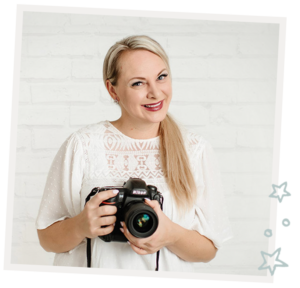
I'm
Lisa DiGeso
I’m on a mission to create uplifting online experiences for photographers ready to elevate their art, their business and their mindset.(...and have fun along the way!)

